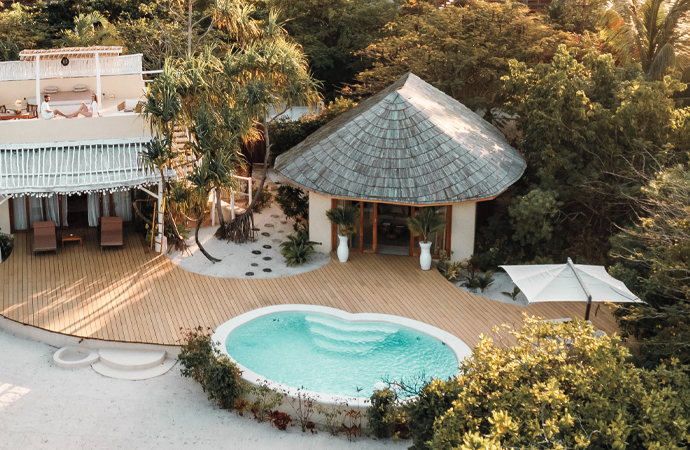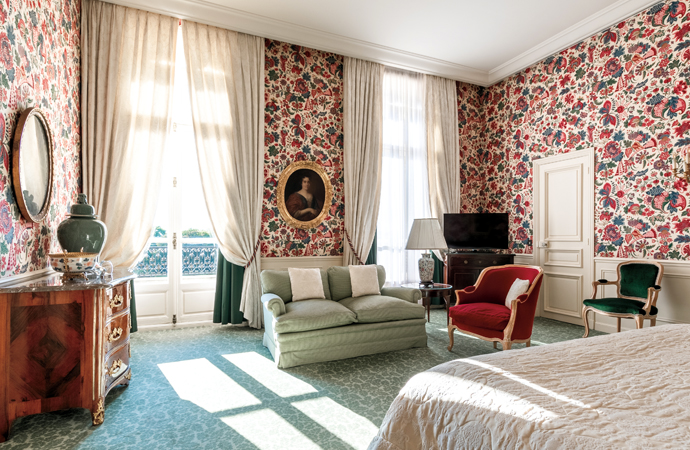Relais & Châteaux President Laurent Gardinier: How Luxury and Sustainability Can Coexist
Leading the diverse network of properties poses unique challenges when it comes to implementing a consistent sustainability strategy
by Todd Plummer
January 15, 2024

Relais & Châteaux president Laurent Gardinier / Photo: Courtesy of Relais & Châteaux/Dominique Cabrelli
The relationship between luxury and sustainability is a question that continues to engage the hospitality world. And since assuming the role of president at Relais & Châteaux in January 2023, Laurent Gardinier has made that question a primary focus.
As the co-owner of the Domaine Les Crayères hotel in Reims and Michelin-starred Le Taillevent in Paris, Gardinier is a classically French hotelier and restaurateur, perfectly schooled in the arts of hospitality and haute cuisine. And as a leader, he served on Relais & Châteaux’s board for 17 years before his current appointment. Established in 1954 by a group of hoteliers and restaurant owners as a way to offer travelers a consistent level of quality, Relais & Châteaux from its beginning has espoused the “Fine Arts of Living.” Today, that network spans 580 member properties in 65 countries across five continents—including some of the finest hotels and restaurants in the world.
Applicants are selected for admission based on a rigorous screening of character, service, cuisine and commitment to preserving local culture. It is the world’s largest network of chefs, whose restaurants collectively hold 340 Michelin stars. Relais & Châteaux operates as a nonprofit organization with a set of governing principles and shared values, with each property remaining independent. Its structure and scale are distinct from every other hospitality group in the world. It is clear that Gardinier is not interested in Relais & Châteaux merely offering a reservation platform and shared marketing efforts for the group. He envisions the empowerment of each member to participate in the development of a better world.
Easier said than done. A defining characteristic of the group is the wide assortment of its members. It ranges from the Zanzibar White Sand Luxury Villas & Spa, on a palm-fringed coast of the Indian Ocean, to the Inn at Hastings Park, a charming New England property in Lexington, Massachusetts—and from châteaux in the idyllic French countryside to fine restaurants in the world’s largest cities.

Zanzibar White Sand Luxury Villas & Spa / Photo: Courtesy of Zanzibar White Sand Luxury Villas & Spa
Leading such a diverse membership poses inherent challenges, especially when it comes to implementing a consistent strategy for sustainability. A Japanese ryokan won’t operate the same way, or have access to the same vendors, as Indian safari camp Suján Jawai, or Eleven Madison Park in Manhattan. “It is impossible to have one single approach for all our members,” says Gardinier. So how to approach that task? “First of all, it is important to remember that we need to provide a service to our members. So we are trying to create an ecosystem of best practices.”
That ecosystem stands on three pillars: environmental conservation, sustainable cuisine and social empowerment, “all while maintaining the financial health of our association,” says Gardinier. His goals are ambitious. Environmental conservation includes the elimination of single-use plastics across all member properties by 2025, as well as comprehensive monitoring and reduction of energy consumption and water usage by 2030. Sustainable cuisine includes responsible sourcing, an emphasis on organic, local and seasonal produce, and having all food waste separately collected or composted. And under social sustainability, he hopes to foster gender parity for women in each member’s top ten salaries and have 100 percent of members perform dedicated training sessions for Equality, Diversity and Inclusion policies.

Chambre Impériale at Domaine Les Crayères, Reims, France / Photo: Courtesy of Domaine Les Crayère/Relais & Châteaux
To achieve those goals, Gardiner and his team work closely with the membership on a case-by-case basis, identifying the best global standards from ethical seafood sourcing to lower-impact linen cleaning, and connecting members to the best suppliers in their region for everything from ethically harvested meats to biodegradable toiletry amenities.
“The minds of people have really changed over the last ten years,” says Gardinier. Sustainability is no longer seen as something niche or inelegant—and he is on a mission to prove that being the world’s most exclusive consortium of hoteliers and restaurateurs need not be mutually exclusive with doing what’s right for the planet. For that task, he draws on both his global perspective as a longtime leader within the association and his quintessential French je ne sais quoi from decades of hotel and restaurant ownership. There has been a shift, he believes, and the future of sustainability in hotels is looking bright: “The more luxury you are, the more sustainable you have to be.”




